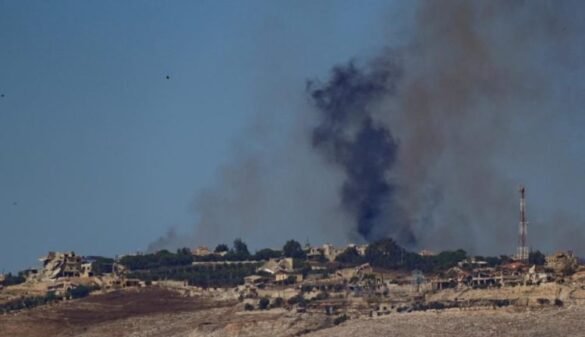Hezbollah counterattacks the northern Israeli city of Haifa, firing five rockets late Sunday night, leaving eight people injured and causing significant damage, Israeli authorities have confirmed. This marks the first time since the 2006 conflict between Israel and Hezbollah that Haifa, Israel’s third-largest city, has been directly targeted. The attacks are part of the escalating hostilities in northern Israel, triggered by Hezbollah’s support for Hamas following the October 2023 Gaza war.
Hezbollah’s Rocket Attack on Haifa
According to the Israeli Defense Forces (IDF), the rockets fired by Hezbollah originated from Lebanon and were aimed at Haifa’s civilian and military infrastructure. Hezbollah claimed responsibility, stating that they had targeted a military base south of Haifa as retaliation for Israel’s recent air strikes on Hezbollah targets in Lebanon. However, Israeli officials dismissed this, calling it a direct attack on civilians. Eliran Tal, a spokesman for Haifa’s municipality, reported that two residential neighborhoods were hit, damaging apartment blocks and a nearby supermarket.
The IDF acknowledged that the air defense systems failed to intercept the rockets. In a statement, the military said, “Interceptors were fired. Fallen projectiles were identified in the area. The incident is under review.” Haifa’s residents, estimated at around 280,000, were urged to stay indoors as emergency services responded to the aftermath of the strikes.
Impact and Injuries in Haifa
The rockets that struck Haifa caused injuries to at least eight people, according to Israel’s Magen David Adom (MDA) ambulance service. A 13-year-old boy and a 22-year-old man sustained moderate injuries from shrapnel and blast effects. The MDA also treated others for minor injuries, primarily from broken glass and debris caused by the blasts.
Local emergency services reported that one rocket hit a roundabout near a supermarket, while another impacted an apartment block, shattering windows and leaving a large crater. “In the beginning, we didn’t find any injuries, but then we saw four people with minor to moderate injuries,” said Tal Rosen, a first responder at the scene.
Hezbollah’s Escalating Involvement
Hezbollah’s counterattack on Haifa comes as part of a broader campaign of rocket fire into northern Israel. On Sunday alone, the group launched over 135 rockets, targeting towns across the region. While some were intercepted by Israeli defenses, others, like those in Haifa, reached their targets. Hezbollah claims these strikes are in solidarity with Palestinians and a response to Israel’s ongoing military operations in Gaza and Lebanon.
In a statement released by Hezbollah, the group claimed responsibility for launching “a salvo of Fadi 1 rockets at the Carmel base south of Haifa,” referencing the location of the military base it targeted. However, local officials have refuted this, asserting that civilian areas were the primary targets. Hezbollah remains defiant, vowing to continue its rocket attacks despite suffering significant losses in recent weeks due to Israeli airstrikes on Beirut and southern Lebanon.
Israel’s Military Response
Following the attack on Haifa, Israeli forces launched airstrikes on Hezbollah positions in Lebanon, targeting infrastructure believed to be used by the militant group. Israeli warplanes struck several locations in Beirut, further escalating tensions between the two nations. According to the Israeli military, a third division has also been deployed in southern Lebanon to bolster the country’s defense against Hezbollah attacks near border villages.
As the conflict continues, Israel’s government has reiterated its commitment to securing the northern region and ensuring the safety of residents displaced by the cross-border fighting. Prime Minister Benjamin Netanyahu has vowed to eliminate the threat posed by Hezbollah, stating that Israel “will not tolerate any attacks on its civilians or military.”
Broader Context of the Conflict
Hezbollah’s attacks on northern Israel began in early October 2023, one day after Hamas launched a deadly attack on southern Israel. Since then, Hezbollah, an ally of Hamas, has fired hundreds of rockets into northern Israeli towns and cities, aiming to weaken Israel’s military and economic infrastructure. In response, Israeli forces have conducted extensive air and ground operations in southern Lebanon, seeking to neutralize Hezbollah’s ability to launch attacks from across the border.
The violence has displaced thousands of civilians on both sides of the conflict, with many in northern Israel fleeing their homes due to the constant threat of rocket fire. Israel’s defense minister has assured the public that every measure is being taken to ensure the safety of the region, stating, “We will do whatever it takes to push the enemy far from our border.”
Conclusion
Hezbollah’s counterattack on the northern Israeli city of Haifa marks a dangerous escalation in the ongoing conflict between the Lebanese militant group and Israel. With both sides exchanging rocket fire and airstrikes, tensions remain high in the region. As the fighting continues, Haifa and other northern cities brace for further attacks, while Israel’s military intensifies its efforts to defend its citizens and prevent further casualties.
As the conflict unfolds, it remains uncertain how long the hostilities will continue or if diplomatic solutions can be achieved. However, one thing is clear: the region faces an extended period of violence and instability if a ceasefire is not reached soon.
Stay connected to know more on arcnews.online for global news like Hezbollah Counterattacks Northern Israeli City of Haifa. For videos updates visit our YouTube. Do subscribe to Arcnews to get latest updates directly in your mail box.
Have A Great Day.


